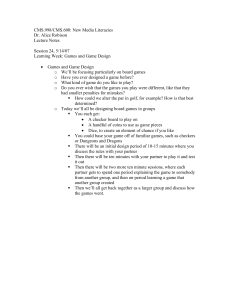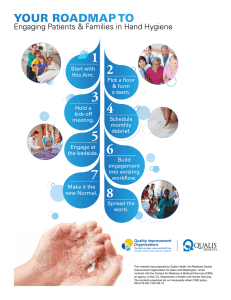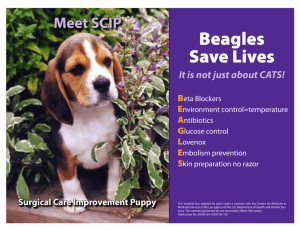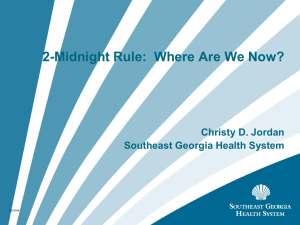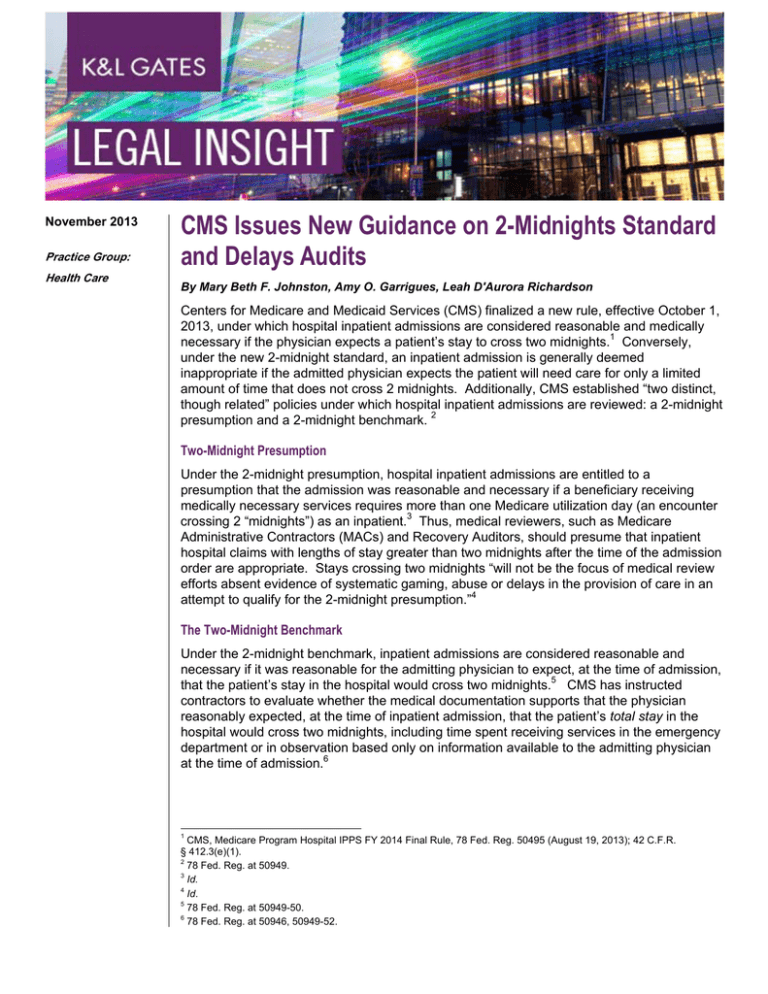
November 2013
Practice Group:
Health Care
CMS Issues New Guidance on 2-Midnights Standard
and Delays Audits
By Mary Beth F. Johnston, Amy O. Garrigues, Leah D'Aurora Richardson
Centers for Medicare and Medicaid Services (CMS) finalized a new rule, effective October 1,
2013, under which hospital inpatient admissions are considered reasonable and medically
necessary if the physician expects a patient’s stay to cross two midnights.1 Conversely,
under the new 2-midnight standard, an inpatient admission is generally deemed
inappropriate if the admitted physician expects the patient will need care for only a limited
amount of time that does not cross 2 midnights. Additionally, CMS established “two distinct,
though related” policies under which hospital inpatient admissions are reviewed: a 2-midnight
presumption and a 2-midnight benchmark. 2
Two-Midnight Presumption
Under the 2-midnight presumption, hospital inpatient admissions are entitled to a
presumption that the admission was reasonable and necessary if a beneficiary receiving
medically necessary services requires more than one Medicare utilization day (an encounter
crossing 2 “midnights”) as an inpatient.3 Thus, medical reviewers, such as Medicare
Administrative Contractors (MACs) and Recovery Auditors, should presume that inpatient
hospital claims with lengths of stay greater than two midnights after the time of the admission
order are appropriate. Stays crossing two midnights “will not be the focus of medical review
efforts absent evidence of systematic gaming, abuse or delays in the provision of care in an
attempt to qualify for the 2-midnight presumption.”4
The Two-Midnight Benchmark
Under the 2-midnight benchmark, inpatient admissions are considered reasonable and
necessary if it was reasonable for the admitting physician to expect, at the time of admission,
that the patient’s stay in the hospital would cross two midnights.5 CMS has instructed
contractors to evaluate whether the medical documentation supports that the physician
reasonably expected, at the time of inpatient admission, that the patient’s total stay in the
hospital would cross two midnights, including time spent receiving services in the emergency
department or in observation based only on information available to the admitting physician
at the time of admission.6
1
CMS, Medicare Program Hospital IPPS FY 2014 Final Rule, 78 Fed. Reg. 50495 (August 19, 2013); 42 C.F.R.
§ 412.3(e)(1).
2
78 Fed. Reg. at 50949.
3
Id.
4
Id.
5
78 Fed. Reg. at 50949-50.
6
78 Fed. Reg. at 50946, 50949-52.
Centers for Medicare and Medicaid Services (CMS) Issues
New Guidance on 2-Midnights Standard and Delays Audits
New Guidance
On November 1, 2013, CMS updated its Frequently Asked Questions and issued new
guidance on this standard.7 Notably, CMS extended the time period during which Recovery
Auditors are not permitted to review inpatient admissions crossing zero to one midnight.
This period now extends through March 31, 2014.8 CMS explained that until the grace
period ending on April 1, 2014, MACs will conduct a prepayment review of Medicare Part A
claims that span zero to one midnight to determine hospitals’ compliance with the new rule
and provide feedback to CMS for education and guidance purposes. CMS is limiting these
prepayment record reviews to 10 claim samples for most hospitals to 25 claim samples for
large hospitals. Non-compliant claims will be denied and MACs are directed to call providers
with “moderate to significant or major concerns” regarding inpatient admission billing patterns
to discuss the denial, answer questions, and provide education and pertinent reference
material.
CMS also made the following clarifications:
•
Greater than 2 midnight stays only subject to review for gaming and abuse.
CMS reiterated that it will instruct MACs and Recovery Auditors not to review
claims that span more than two midnights after admission, absent evidence of
gaming or abuse. Review contractors will, however, continue to review inpatient
stays that cross 2 midnights for that purpose -- to monitor for patterns of
gaming, such as delaying care or providing inappropriate care. CMS clarified in
separate guidance that MACs have been instructed to identify such improper
Medicare payment activity though its probe reviews and data gathered by the
Comprehensive Error Rate Testing (CERT) contractor, First-look Analysis for
Hospital Outlier Monitoring (FATHOM), and Program for Evaluating Payment
Patterns Electronic Report (PEPPER). 9 CMS plans to shift reviewers’ attention
to the anticipated smaller volume of short inpatient stays and eventually ramp
down review of short stays once hospitals consistently apply the 2-midnight
benchmark correctly.
•
Retrospective review not appropriate. CMS further reiterated that, consistent
with CMS’ long-standing policy, medical reviewers should not conduct
retrospective review of the medical records, but rather evaluate the
reasonableness of the physician’s expectation that a patient’s stay will cross 2
midnights based on the information available to the physician at the time of
admission.
•
Start time for calculating the total time of hospital care under the 2-midnight
benchmark is start time of care. CMS clarified that, for inpatient stays that do not
cross 2 midnights, review contractors should consider the time that the patient
began receiving outpatient services, including services received in the
emergency department or under observation and time spent undergoing a
procedure, such as in an operating room. It was noted that the time receiving
these services cannot be considered inpatient time since there would not be a
7
CMS, Frequently Asked Questions, 2 Midnight Inpatient Admission Guidance & Patient Status Review for Admission on
or after October 1, 2013.
8
Id. Initially, CMS stated that Recovery Auditors were prohibited from reviewing such admissions for 90 days after the
October 1, 2013 effective date.
9
CMS, Reviewing Hospital Claims for Patient Status: Admissions On or After October 1, 2013.
2
Centers for Medicare and Medicaid Services (CMS) Issues
New Guidance on 2-Midnights Standard and Delays Audits
formal inpatient admission order under these circumstances, but would be taken
into account under the 2-midnight benchmark. Time spent in the emergency
department waiting room or receiving triage services do not count as the start
time under this benchmark. It further noted that hospital care that is for
custodial or convenience purposes, such as a hospital stay that crosses 2
midnights due to a delay in a procedure not being immediately available, are
excluded under Part A payment as not required for diagnosis or treatment, and
thus will not be taken into account under the 2-midnight benchmark.
10
•
Separate attestations not required. According to CMS, a separate attestation
from the physician regarding the expected length of an inpatient hospital stay is
not required or expected. Rather, the medical record should be “rooted in good
medical practice,” with reasonableness of the physician’s expectation for the
length of a patient’s stay inferred from the physician’s standard documentation,
including notes, plan of care and treatment orders which outline the patient’s
age, signs and symptoms, comorbidities, risk for adverse outcome and other
factors that influence a physician’s decision to admit a patient. CMS noted that
utilization committee screening decisions are not binding on CMS or the review
contractors, and that the review contractors will evaluate the reasonableness of
the physician’s inpatient admission decision based on the medical record.
•
Hospital care less than 2 midnights warrants inpatient status only in rare and
unusual circumstances. Inpatient care for less than 2 midnights will not be
considered appropriate for inpatient admission “absent rare and unusual
circumstances to be further detailed in sub-regulatory instruction.” 10 CMS
stated that, in addition to a beneficiary’s death, transfer, or departure against
medical advice, many of these circumstances are already identified in the
Inpatient Only list. CMS further noted that placing a patient in a telemetry or ICU
unit, without more, does not qualify as a rare or unusual circumstance. CMS
expects to include additional examples of circumstances considered rare and
unusual in sub-regulatory guidance as those examples are identified. In such
cases, physicians are encouraged to explicitly document in the medical record
the reasons why an inpatient admission is warranted despite an expectation that
a hospital stay will last less than 2 midnights. The discretion will remain with
CMS and the review contractors as to whether the documentation supports the
medical necessity of the admission. CMS also encouraged providers to email
CMS with additional suggested examples of rare and unusual circumstances
warranting exception to the general 2-midnight rule.
•
Denials related to inpatient care not crossing 2 midnights are not automatic.
CMS emphasized that stays lasting less than 2 midnights will not be
automatically denied; however, it expects most hospital stays lasting less than 2
midnights will be provided on an outpatient basis.
78 Fed. Reg. at 50946.
3
Centers for Medicare and Medicaid Services (CMS) Issues
New Guidance on 2-Midnights Standard and Delays Audits
Conclusion
Denials related to appropriate level of care have been a significant focus of the Recovery
Audit Contractor program, and hospital appeals related to such denials have been increasing
at a rapid pace in recent years. Hospitals should educate providers on the intricacies of this
new rule on the front end in an attempt to avoid future denials and the subsequent costs of
the appeal process.
Authors:
Mary Beth F. Johnston
Amy O. Garrigues
Leah D'Aurora Richardson
marybeth.johnston@klgates.com
+1.919.466.1181
amy.garrigues@klgates.com
+1.919.466.1275
leah.richardson@klgates.com
+1.919.466.1126
Anchorage Austin Beijing Berlin Boston Brisbane Brussels Charleston Charlotte Chicago Dallas Doha Dubai Fort Worth Frankfurt
Harrisburg Hong Kong Houston London Los Angeles Melbourne Miami Milan Moscow Newark New York Orange County Palo Alto Paris
Perth Pittsburgh Portland Raleigh Research Triangle Park San Diego San Francisco São Paulo Seattle Seoul Shanghai Singapore Spokane
Sydney Taipei Tokyo Warsaw Washington, D.C. Wilmington
K&L Gates practices out of 48 fully integrated offices located in the United States, Asia, Australia, Europe, the Middle East and South
America and represents leading global corporations, growth and middle-market companies, capital markets participants and
entrepreneurs in every major industry group as well as public sector entities, educational institutions, philanthropic organizations and
individuals. For more information about K&L Gates or its locations, practices and registrations, visit www.klgates.com.
This publication is for informational purposes and does not contain or convey legal advice. The information herein should not be used or relied upon in
regard to any particular facts or circumstances without first consulting a lawyer.
©2013 K&L Gates LLP. All Rights Reserved.
4

